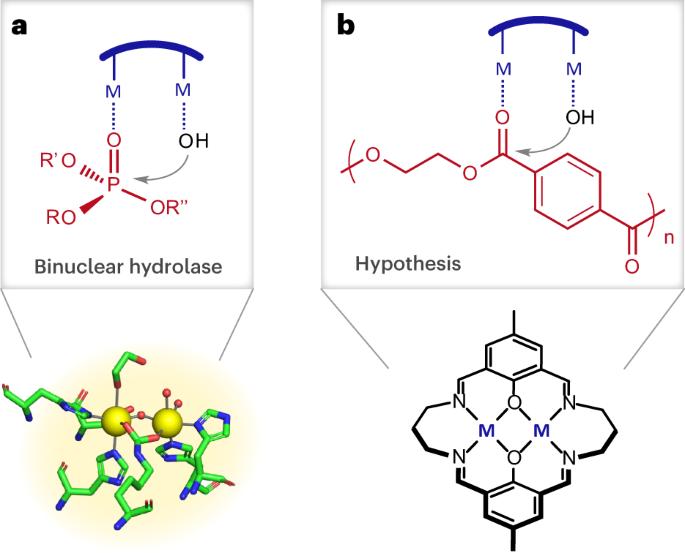Depolymerization of polyesters by a binuclear catalyst for plastic recycling
IF 27.1
1区 环境科学与生态学
Q1 ENVIRONMENTAL SCIENCES
引用次数: 7
Abstract
Plastics play an essential role in modern society; however, the relentless growth of their production is threatening both human health and ecosystems. As a result, there are intensive efforts in developing recycling technologies to repurpose waste plastics into the building blocks for valuable materials. Here we show a binuclear complex that can catalyse the degradation of poly(ethylene terephthalate) (PET)—the most widely used polyester globally—and a wide spectrum of other plastics including polylactic acid, polybutylene adipate terephthalate, polycaprolactone, polyurethane and Nylon 66. Inspired by hydrolases, the group of enzymes that catalyse bond cleavages with water, the present catalyst design features biomimetic Zn‒Zn sites that activate the plastic, stabilize the key intermediate and enable intramolecular hydrolysis. This synthetic catalyst delivers an activity of 36 mgPET d−1 gcatal−1 toward PET depolymerization at pH 8 and 40 °C and an activity of 577 gPET d−1 gcatal−1 at pH 13 and 90 °C for scalable PET recycling. We further demonstrate a closed-loop production of bottle-grade PET. This work presents a practical and viable solution for the sustainable management of plastics waste. Plastic pollution forms a major global challenge to the ecosystem. Here the authors show a binuclear catalyst that could degrade various polyesters in an effective and scalable way, providing a promising technological solution to the challenge.

塑料回收用双核催化剂解聚聚酯
塑料在现代社会中发挥着至关重要的作用;然而,塑料产量的持续增长正在威胁人类健康和生态系统。因此,人们正在大力开发回收技术,将废塑料重新利用为有价值材料的组成部分。在这里,我们展示了一种双核复合物,它可以催化全球使用最广泛的聚酯--聚对苯二甲酸乙二醇酯(PET)以及包括聚乳酸、聚己二酸丁二醇酯对苯二甲酸酯、聚己内酯、聚氨酯和尼龙 66 在内的多种其他塑料的降解。本催化剂的设计灵感来源于水解酶(一种能催化水键裂解的酶类),其生物仿生 Zn-Zn 位点能激活塑料、稳定关键中间体并实现分子内水解。这种合成催化剂在 pH 值为 8、温度为 40 ℃ 的条件下,PET 解聚活性为 36 mgPET d-1 gcatal-1;在 pH 值为 13、温度为 90 ℃ 的条件下,活性为 577 gPET d-1 gcatal-1,可用于 PET 的规模化回收。我们进一步展示了瓶级 PET 的闭环生产。这项工作为塑料废弃物的可持续管理提供了一个切实可行的解决方案。塑料污染是全球生态系统面临的一大挑战。作者在此展示了一种双核催化剂,它能以有效和可扩展的方式降解各种聚酯,为应对这一挑战提供了一种前景广阔的技术解决方案。
本文章由计算机程序翻译,如有差异,请以英文原文为准。
求助全文
约1分钟内获得全文
求助全文
来源期刊

Nature Sustainability
Energy-Renewable Energy, Sustainability and the Environment
CiteScore
41.90
自引率
1.10%
发文量
159
期刊介绍:
Nature Sustainability aims to facilitate cross-disciplinary dialogues and bring together research fields that contribute to understanding how we organize our lives in a finite world and the impacts of our actions.
Nature Sustainability will not only publish fundamental research but also significant investigations into policies and solutions for ensuring human well-being now and in the future.Its ultimate goal is to address the greatest challenges of our time.
文献相关原料
公司名称
产品信息
麦克林
Crystalline PET granule
|
38%
 求助内容:
求助内容: 应助结果提醒方式:
应助结果提醒方式:


